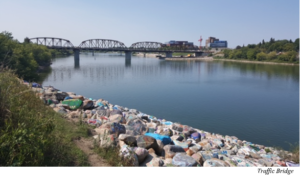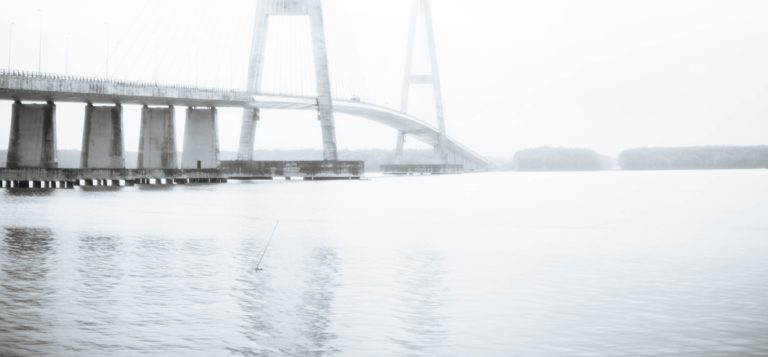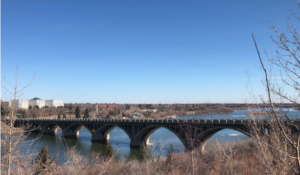Broadway Bridge
Shortly after your dad and I met in Korea in 1996, his steamy baritone filled a rented karaoke room. The Beatles’ “Yesterday” was the first song I heard him sing. His sorrowful voice infiltrated the stone walls I’d built around my heart. It could have been his muscular arms, his impish grin, or the beer we were drinking, but by the time his voice trebled with Simon & Garfunkel’s “Bridge Over Troubled Water,” a drawbridge lowered over our cultural gulf. These songs spoke a language I understood and founded the life we briefly built together.
~
Remember the wild dance parties the two of us held in our first house—just you, me and my old mixed tapes scattered across our library floor? At six years old, your pensive amber eyes implored mine as you said, “Mama, it’s so sad she has to be that strong.” At twenty-eight, though I’d sung Tracy Chapman’s songs hundreds of times before, the lyrics finally hit home. In “Baby Can I Hold You,” there is so much tragedy behind “Years gone by and still/ Words don’t come easily/ Like forgive me, forgive me.”
~
If I could, I’d journey back to the days before I married your dad to share with him the sheet music for The Judds’ 1990 ballad “Love Can Build a Bridge.” Then, rather than reciting empty vows that fell on deaf ears, we might have sung, “When we stand together/ It’s our finest hour/ We can do anything.” Had I read the lyrics I might have understood that love is about standing together, not falling. Who knows, we might have stood a chance.
~
I’d return to Granny’s apartment the eve of Y2K, when you were two years old, if I could take a second journey back in time. At 11:59, your dad and I stood by your playpen and startled you by shouting, “Happy New Millennium!” Sure, you screamed red-faced for a while, but at that critical moment in history we three stood united. After shushing you back to sleep, I should have given your dad a songbook with The Supremes and the Four Tops’ “One More Bridge to Cross.” The lyrics voice the question that threatened our hearts: “Is there always gonna be one more bridge to cross?” As you know, three months after this night, on my twenty-fifth birthday, I will be diagnosed with lung cancer. Six weeks after my pneumonectomy, we’ll fly to Korea so your dad can find a job. Life in Canada will offer us no viable options.
~
“We’ll cross that bridge when we get there,” I told your dad when icebergs and sandbars stood in our path—his immigration status, the depletion of my student loans, the possibility I’d succumb to cancer. But then, in February of 2002, I was too exhausted to keep struggling against the torrents that awaited us at every turn in our journey. You and I flew across the ocean, back to Canada. The porthole shuttered tight, I refused to glance back.
Demolish
Traffic Bridge
Believe it or not, there was a maritime disaster in Saskatoon in 1908. The steamship S.S. City of Medicine Hat crashed broadside into one of the Traffic Bridge’s piers and sank. Turns out your dad and I weren’t the only ones to collide with a bridge on flat land. As a marine, your dad would have relished in this story—maybe he would have felt at home.
~
I’ve only burned one important bridge, but it’s one I regret. You were eight the summer of 2006 when I hung up on your dad who was still in Korea. Then I refused to take his calls, and our burning bridge blazed out of control. Eventually, our phone stopped ringing. Your dad abandoned ship.
~
For years, Simon & Garfunkel blasted “Homeward Bound” on the speakers as we voyaged, as I tried to find a way to navigate my turbulent waters. Gazing at you through the rear-view mirror as you crooned along in the backseat, I couldn’t recognize what you were—what you’ve always been—my second mate, my safety net.
~
After we moved to Saskatoon in 2008, I swear I could feel the Traffic Bridge sway as I waited in the angry queue of taillights on my commute to work. Though it filled me with fear, these two narrow lanes were the only way to traverse the river for a while. Eking along in my truck, I pictured collapse. Should we plummet, I prayed I’d manage to jump before the river swallowed me whole.
~
In 2009, the same year The City of Saskatoon closed the Traffic Bridge, I entered a touch-and-go relationship with an ill-tempered man. By 2011, the Foo Fighters’ disenchanted lyrics of “Bridge Burning” mirrored my angst. I bellowed at the top of my lungs, “It’s all coming down…” That relationship lasted six years, and the bridge was closed for nine. This period of time spans your adolescence and early adult life. The years my mental health dogpaddled. Sometimes what appears to be solid falls apart. Sometimes repairs are possible. Neither come with definite timelines.
~
On January 10, 2016, thousands of people gathered on the neighbouring Broadway Bridge to witness the implosion of two south spans of the Traffic Bridge. In February, a portion of the far north span was demolished by explosives. I did not attend. I’ve never been great at goodbyes.
Repair
The arches under the University Bridge get smaller as they descend, like a stone skipping across the water. The geographical gaps in our journey started as bounds, but over the years the distance between our coordinates have shrunk. From Canada to Korea back to Canada. From Saskatchewan to Quebec back to Saskatchewan. From North Battleford to Saskatoon. Finally, from the house we shared for almost a decade to your bachelor pad. By charting our course, I hope our misunderstandings will vanish.
~
Remember when you were ten and hand-in-hand we trekked across University Bridge? We retraced the route I’d trod as a student and as your young mother. At the big white church that was your first daycare, I explained how I’d also lived in the red brick building next door before you were born. How every Sunday at six o’clock, I waited for Granny to call the payphone in the alley because I couldn’t afford a phone. Then, we headed north to the apartment where you took your first step and cut your first tooth. My eyes misted over as I explained how, even at eleven-months, you insisted on carrying Dada’s letter several blocks to the mailbox. After I described the train engineer outfit you’d worn that day—the one with the corduroy hat that matched the navy-blue pants, you asked, “How can you remember things like that?” I explained, “Some things are too precious to forget.”
~
In September 2018, you turned twenty-one. The same age I was in that karaoke room where your dad first sang for me. I’d almost forgotten about the Traffic Bridge by the time it re-opened that October. I’d almost forgotten the crumbling piles littering my past, the bridges I have yet to repair.
~
I pray someday your dad forgives me for “Yesterday.” If I could turn back time, I’d tell him I was afraid of sinking under the weight of bridging east and west. Afraid of being tugged by the undertow. Of drowning. Perhaps he would admit to being afraid, too. Standing on that same span, perhaps he felt as though I shoved him overboard without a life preserver. Maybe you feel your dad did the same to us. It’s you who suffers because of our history of crossings, and for this I’m sure your dad, like me, drowns in remorse.
~
We haven’t seen your dad in seventeen years, but his baritone still pops into my head every now and then. He stands proudly in his navy uniform or sits cross-legged in his beloved Peruvian poncho with his long square toes holding open his songbook as he strums his battered guitar. Whenever he plucks the opening chords to “Yesterday,” I shush him. If only I could type up our tragedy, tear it into a bazillion pieces and watch it float away. But some stories take longer to moor.
~
Mornings, I fill my pockets with stories I no longer need to lug around and cross the bridges I love. Suspended in the void that belongs to the birds and the breeze helps me believe I’m on the brink of flying. With each crossing, I pause near the centre. Leaning against the concrete railing, I throw my arms wide—hair flailing Medusa-like—and fling free my shame. My pockets grow light as guilt flutters toward the current then catches in the undertow.


